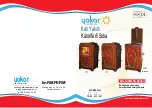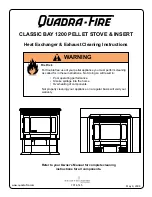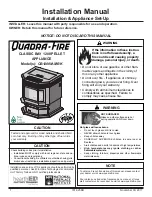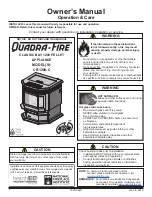
14
Correct heating up
1. Move the control lever completely to “heating-up position”. Open
the combustion chamber door and sweep the ashes into the ashtray.
Place left and right two small pieces of chipboard lengthways in the
bottom of the combustion chamber.
Place two logs crossways on top of this chipboard.
2. Now place further pieces of chipboard in crosswise layers on top
of the logs and place 2-4 ribs of the RIKA-firelighter on top of the
chipboard. Some uncoated paper can be placed underneath the
chipboard in case there is no firelighter available.
3. Now light the firelighter (or the uncoated paper) and close the
combustion chamber door.
Set the control knob for combustion air regulation to middle position
some minutes later. If the logs are well lit the control knob can be
set one step further to zero position another few minutes later
(depending on draught and fuel quality / amount).
Refilling
After the first burn-off, add one or two logs (see AMOUNT OF FUEL)
to the blaze. Set the control knob to heating-up position again until
the wood is well lit.
For optimum combustion, the air regulator should be set between
medium and zero position.
Note
Sometimes a lot of smoke develops when wood is placed on a
low firebed or when there is too less fresh air for combustion. An
explosive gas/air mixture may arise and cause an eventual heavy
deflagration. For safety reasons it is recommended to leave the
combustion chamber door closed and press the control knob at
the rear wall down completely into “heating-up position”. If the
log wood is not igniting, start a new heating-up procedure after it
stopped smoking.
Please proceed in the same way for every further addition of wood.
Summary of Contents for BACK
Page 1: ...Operating manual BACK...
Page 18: ......






































